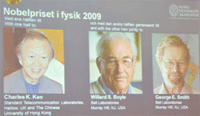 The 2009 Nobel Prize in Physics went to Charles K. Kao, Willard S. Boyle and George E. Smith, all from the
The 2009 Nobel Prize in Physics went to Charles K. Kao, Willard S. Boyle and George E. Smith, all from the
The 2009 Nobel Prize in Physics went to Charles K. Kao, Willard S. Boyle and George E. Smith, all from the
Kao was awarded "for groundbreaking achievements concerning the transmission of light in fibers for optical communication," and Boyle and Smith were awarded "for the invention of an imaging semiconductor circuit -- the CCD sensor," the
Among the three, Kao is a Chinese-American who was born in
The CCD is the digital camera"s electronic eye. It revolutionized photography, as light could now be captured electronically instead of on film. CCD technology is also used in many medical applications, e.g. imaging the inside of the human body, both for diagnostics and for microsurgery as well as astronomy, said the Nobel Committee.
Kao who was electronic engineer and vice-chancellor of
The two scientific achievements have helped to shape the foundations of today"s networked societies by creating many practical innovations for everyday life and provided new tools for scientific exploration, added the Nobel Committee.
This was the second of this year"s crop of Nobel prizes, which are handed out annually for achievements in science, literature, economics and peace.
All but one of the prizes were established in the will of 19th century dynamite millionaire Alfred Nobel. The economics award was established by
On Monday, the Nobel Medicine Prize went to Elizabeth H. Blackburn, a
Nobel died childless and dedicated his vast fortune to create "prizes for those, who, during the preceding year, shall have conferred the greatest benefit on mankind."
The prizes have been awarded since 1901. Each prize consists of a medal, a personal diploma and a cash award of 10 million Swedish kronor (about 1.4 million U.S. dollars).

 Previous page
Previous page Back to top
Back to top







